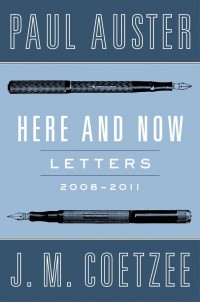 Here and Now: Letters 2008-2011
Here and Now: Letters 2008-2011
by Paul Auster and J.M. Coetzee
Viking, 2013
248 pages / $27.95 buy from Amazon
1. As the title suggests, this book documents the correspondence between Asturias Prize winner Paul Auster and Nobel Prize winner J.M. Coetzee from 2008-2011.
2. According to my calculations there are 79 letters, though some letters include emails explaining a fax machine is broken or low on ink.
3. It is not revealed if either titan of world literature had to dial a 9 before faxing.
4. There is no editor’s note, introduction, epilogue or index. Peculiar for a book of letters. There are footnotes but only sometimes: a biography of Kafka is footnoted while Pierre Clastres’ Chronicle of the Guayaki Indians is not.
5. 11 letters were exchanged in 2008, 30 in 2009, 25 in 2010 and 13 in 2011. The 2008 and 2011 exchanges are high-spirited, covering topics ranging from why men enjoy watching sports to the film director William Wyler.
6. On the 24th letter they perfect their flow: “Thank you for yesterday’s fax. I feel that we have finally hit upon a workable system. A slow letter across the seas from America to Australia and then a quick, electronic transmission of paper from a room in a house in Adelaide to a room in a house in Brooklyn.”
7. I would’ve liked to have been a fly on the whiteboard when Viking Press gave the green light to the title. I could’ve squashed myself.
8. Coetzee is why I wanted to read this book. I thought I’d never read a book by Auster. Halfway through I realized I have read several of his books, years ago, but I still don’t remember reading them. Is not reading a book and not remembering reading a book the same thing? Scrolling for Auster I found James Wood’s mean-spirited article from 2009. Whenever James Wood decides someone is a bad writer they deserve a closer look.
9. “The emboldened critic,” Coetzee says in letter 42, “becomes like the child lobbing pebbles at the gorilla in the zoo, knowing he is protected by the bars.” Auster on James Wood: “I mustn’t complain, least of all about a man whose name suggests that one day he will be eaten by termites.”
10. This book made me miss my grandfathers.
11. As the low-spirited Times reviewer points out, mentioning something called the “e-revolution,” it’s a weird moment for literary letters as a genre (opposed to all those normal moments for other literary genres) and this current generation of writers — say, writers who have never even touched a fax machine — may no longer dream of saving their letters in three-ring binders, because, well, who cares? This is reflected in hardcover markdowns. I bought Bellow’s letters and Beckett’s letters, beautiful hardcovers, for a total of $9.96 at my local bookshop. And when I picked up Here and Now from the library I could almost see the SALE: $4.98 sticker that will soon be obscuring one of its elegant fountain pens.
12. I find my VHS of Back to the Future II and watch the Read My Fax! scene. The tracking line follows future Marty’s forehead around his home.
13. “High-spirited” is how the jacket copy describes this “luminous” correspondence. Like calling Arnold Vinick spry, this is code word for old people.
14. Coetzee writes about the allegory of the cave without ever calling it the allegory of the cave. I got the impression every time Coetzee explains the allegory of the cave he’s thinking about it for the first time and it’s a shocking idea for him. In other words, it’s like he’s emerging from his own allegory.
15. 23 books also by Auster and 20 books also by Coetzee. If you take away Auster’s Collected Poetry and Collected Prose and Coetzee’s Stranger Shores (SALE $3.98 hardcover at my local bookshop a few years back) they are almost at 21 each.
16. This book is probably about a simple friendship. If there is such a thing as simple friendship. The literary talk is at a minimum. You don’t get the impression they are communicating to pad their archives. These two giants of world literature only meet once in the book, in the summer of 2010 in Pietrasanta, Italy. At the end of the book there is talk of a book tour, a kind of Jay-Z/Timberlake short-run. They discuss preferring not to do this. In many of the letters, especially those that concentrate on the “young male child’s fixation on sporting heroes” it is easy to imagine they are buddies talking about sports and the weather; the letters could’ve taken place at any Big 12 Hooters and not via half-broken fax machines located in “Australia” and “Brooklyn.”
17. Only Auster dates letters from a location: 4 from Brooklyn, 1 from Nantucket, 1 from Hotel d’Aubusson, Paris, the 21st best hotel in Paris according to Trip Advisor. (“Excuse the funny stationary. For some reason, Paris hotel rooms are not equipped with typewriters.”) Coetzee, who suffers from insomnia, has to cancel a trip to Toulouse.
18. It is clear these two men understand each other, like Rex Tillerson and John S. Watson probably understand each other.
19. Coetzee ends the majority of his letters with All the best. Auster closes a December 2009 letter With a hearty ho ho ho. Each letter is addressed Dear John or Dear Paul, except for one Auster addresses to Dear Gramps (the one from Nantucket) for a reason I can’t figure out. All this Dear Paul Dear John got me hoping for a Beatles reunion.
20. Reading Here and Now at Corner Bakery, sipping a $2.08 hazelnut cream coffee, I remember Phillip Roth’s The Prague Orgy, dedicated to his friend Milan Kundera. Another important literary friendship. Back at the office I google “With Philip Roth retired, does this mean he won’t write a sequel to The Prague Orgy?” and get no results. Weirdly, just searching for “The Prague Orgy” doesn’t bring up the Amazon page for the novel until the 6th page. While clicking through I wonder if I’ve made this novel up. No, I distinctly remember reading The Prague Orgy from my parent’s floral-print couch, skimming and looking for the sexy parts, throwing the book down when my father screamed up at me from the basement to get my ass downstairs to help him with the summer storage boxes. Happy little childhood looking for the sexy parts in The Prague Orgy.
21. Exercise for the sake of exercise has always bored Paul Auster. Auster and his wife are “a hopeless pair when it comes to the digital life.” Coetzee mentions cellular technology. In the hands of these two high-spirited masters the word exercise sounds as antiquated as the word fax, as antiquated as the word ATM machine, the word digital sounds ancient, cellular sounds older than Babylon. Even Brooklyn suggests nothing has happened there since the Dodgers left town.
22. I’m reading the book on the train and when the train jerks in a unusual way it occurs to me that North Korea is going to blow up America and/or the world and all copies of Here and Now will disappear, save one. When the Tom Cruise character finds it he will discover that email was a technology far behind fax.
23. Auster speaks of the “power of fiction to affect reality.” Coetzee wonders why the word “incest” describes both the sexual act between father and daughter or mother and son and the act between brother and sister, when the former would seem to be so much worse and deserve its own word. Auster is not interested in homosexual incest.
24. Coetzee on U.S. Homeland Security holding him up at customs: “Who would want to work for a service where you earn promotion not for the number of people you let through but for the number you turn back?” Coetzee has obviously never worked in the arts. Instead of saying “there should be a German word for that” like an American, Coetzee actually supplies the German word for war events in Lebanon and Gaza: schrecklichkeit.
25. Auster sends more attachments with his letters: movie stubs from a showing of Disgrace, clippings from U.S. editorial pages, a Xerox of a photograph of him at age five in his football uniform. The fraternal tenderness only increases in the late spring of 2011 when there are more and more admissions of friendship. Auster says he longs for the absent Coetzee like a “kind of adult cousin to the imaginary friends children invent.” Coetzee returns this affection, and in the last letter of the book chooses the complimentary close: Yours fraternally, John.

Stuart Ross is a writer living in Chicago. He blogs here and tweets here.
Tags: 25 Points, Here and Now: Letters 2008-2011, j m coetzee, Paul Auster, Viking

they seem like a couple of sweethearts
Pierre Bayard takes this up in How to Talk about Books You Haven’t Read. He argues that “have read” and “haven’t read” is too simple a distinction precisely because it’s possible to know a great deal about a book you haven’t read, and to not remember anything about a book you have read. Great book that I highly recommend and am probably misremembering.
Also I’m resisting the urge to say something nasty about James Wood.
@adjameson:disqus I haven’t read the Bayard. I’ll check it out and hopefully remember the right parts.